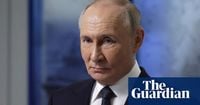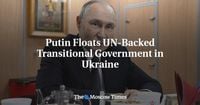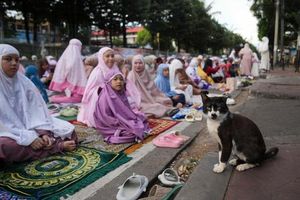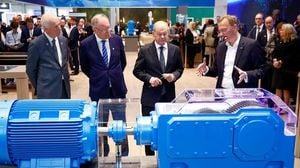In a bold move that has raised eyebrows internationally, Russian President Vladimir Putin suggested on March 28, 2025, that Ukraine could be placed under a UN-sponsored "transitional administration" to oversee elections before any peace agreement is negotiated. This proposal comes amid ongoing military actions in Ukraine's Sumy region, where Russian forces are reportedly intensifying their efforts to advance.
Putin's comments, made during a visit to Murmansk, were aimed at establishing a framework for what he described as democratic elections in Ukraine. He stated, "We could, of course, discuss with the United States, even with European countries, and, of course, with our partners and friends, under the auspices of the UN, the possibility of establishing a transitional administration in Ukraine." He added that such an administration could help facilitate peace talks and organize a democratic presidential election.
However, the White House quickly dismissed Putin's suggestion. A spokesperson from the National Security Council emphasized that governance in Ukraine is determined by its constitution, which prohibits elections during wartime. This constitutional provision has led many observers to view Putin's proposal as an attempt to prolong the conflict rather than a genuine step towards peace.
Ukrainian President Volodymyr Zelensky has been vocal about the need for a response to what he termed Moscow's violations of agreements not to strike Ukrainian energy targets. He has also expressed concerns over the changing terms of a minerals deal proposed by the United States, which he claims could leave Ukraine in a precarious financial position for generations.
Meanwhile, U.S. Secretary of State Marco Rubio characterized high-level talks with Russia as premature, noting that significant groundwork still needs to be laid before any meaningful discussions can occur. Rubio highlighted the necessity for progress on a technical level, stating, "There's a lot of work to be done with both sides, particularly with the Russian side, which we haven't talked to for years."
In a related development, Turkish President Recep Tayyip Erdogan spoke with Putin about security in the Black Sea, reaffirming Turkey's commitment to hosting peace negotiations. Erdogan's office confirmed that the two leaders discussed the resumption of the Black Sea grain initiative, which was initially established to ensure safe navigation for Ukrainian agricultural exports.
Despite a previous withdrawal from the deal by Russia, citing Western sanctions, both countries have agreed to "eliminate the use of force" in the Black Sea, though Russia has indicated it would only adhere to this agreement if restrictions on its agricultural exports are lifted. Erdogan reiterated Turkey's readiness to support efforts to end the ongoing war between Russia and Ukraine.
On the domestic front, Ukraine has indicated it will only publicly discuss the new U.S. minerals deal once a consensus is reached internally. Deputy Prime Minister Yulia Svyrydenko warned that public discussions could hinder constructive negotiations with Washington. The ongoing negotiations reportedly involve a significant shift in the terms, with the U.S. seeking a greater share of Ukraine's natural resources.
As the situation evolves, Zelensky remains cautious about any agreement that might jeopardize Ukraine's financial stability. He has previously stated that he is open to considering a minerals deal but will not accept terms that could leave the country in dire straits.
In a separate incident, Germany's Luftwaffe identified and escorted a Russian reconnaissance aircraft over the Baltic Sea, highlighting ongoing tensions in the region. The IL-20 aircraft, which was flying without a transponder signal, was intercepted by Eurofighter jets but did not enter German airspace.
Putin's remarks regarding the "strategic initiative" of Russian forces in Ukraine have further fueled speculation about the Kremlin's intentions. He claimed that Russian troops are maintaining a strategic advantage on the front lines and expressed confidence in their ability to finish off Ukrainian forces. This assertion comes amid criticism from European leaders, who argue that Putin's actions do not reflect a genuine commitment to peace.
The situation remains fluid, with ongoing discussions among European leaders about the potential deployment of troops in Ukraine to secure a future peace deal. French President Emmanuel Macron has stated that not all nations involved in supporting Ukraine are willing to participate in such plans.
As the international community watches closely, the prospects for peace in Ukraine seem uncertain. With both sides entrenched in their positions, finding common ground will be crucial in the coming weeks. The ongoing conflict and geopolitical dynamics surrounding it continue to evolve, leaving many questions unanswered.
In conclusion, the recent developments surrounding Putin's proposal for a UN-led transitional government in Ukraine and the intensified military actions in the Sumy region underscore the complexities of the ongoing conflict. As diplomatic efforts continue, the situation remains precarious, with significant implications for both Ukraine and its international partners.






